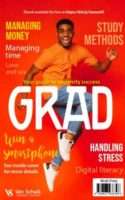Feeding yourself on a small budget can be very difficult, and some students find it almost overwhelming. Here are a few guidelines to start you off:
Eat a variety of foods every day from all three food groups: protein, fruit and vegetables, and starch.
Half of every meal should be vegetables and fruit. Potatoes are starch, not vegetables! Eat more vegetables and fruit than anything else – they protect against illness.
Eat starch with every meal. Choose brown bread and brown rice rather than white; it will keep you full for longer.
Fats/oils should only be a very small part of what you eat. Be careful of takeaways – they often contain far too much fat and salt. Try not to eat deep-fried food, which absorbs a lot of oil.
As far as you can, eat regularly. Eat smaller meals more often and snack on fruit or yoghurt/maas. Do not eat only one big meal per day, especially not at night just before you go to bed.
Breakfast is important. A slice of brown bread/oats/pap, a fruit and a glass of milk will help you through your day.
Sweets and fizzy drinks will give you a “sugar high” and then leave you exhausted. They do not feed the body and too much will make you fat. Stay away from these.
Each of you will find your own solution to the problem of eating correctly and eating enough, but here are some pointers from other students who have walked this road:
Many universities have support systems for students who need help in this regard. Wits has dining halls with reasonably priced meals; UFS has a bursary scheme called No Student Hungry; UJ has a feeding programme that provides meals. Go to the student support office and ask.
Find a few friends and buy and/or cook together. It is cheaper to buy 24 tins of fish that you can share than to buy one at a time, for example.
If you have storage space, buy the basics at the beginning of the term: rice, oil, maize meal, coffee, tea, sugar, dried beans, soup powder, etc.
If there are people selling loose fruit and vegetables on the pavement in the CBD of your city, go there to shop rather than using the chain stores – it’s cheaper.
If you are worried that the CBD may be dangerous, take a couple of friends along. Take only cash, stashed in small amounts in different pockets.
Buy a few tomatoes, a few onions, green beans, carrots and potatoes. They will last a few days and cost very little. Add a packet of meat (sausages, stewing meat, mince), rice or pap, and you have a meal.
If you have access to a fridge or freezer, cook some sugar beans or lentils and keep them cool. They make a good meal when eaten with bread or rice and a fried onion. Drink water, tea and coffee, NOT expensive sugary soft drinks.
If you have never cooked for yourself, try and team up with someone who has. Watch and learn; such lessons last a lifetime!
If you have to cook for yourself and you have no experience, the basics are easy. Buy one solid cooking pot rather than a number of thin cheap ones. Slice or chop some onion and fry it in oil. Add your meat and fry it until it’s browned on all sides. Add vegetables, cut into chunks. Add some water, perhaps with a spoonful of soup powder or stock, and some salt. Close the pot, turn the heat down and cook for half an hour to 40 minutes. Stir now and then so that it doesn’t burn. This makes a very good meal.
Over time you will become more confident and start enjoying cooking. There are thousands of recipes on the internet. Play around with them!


